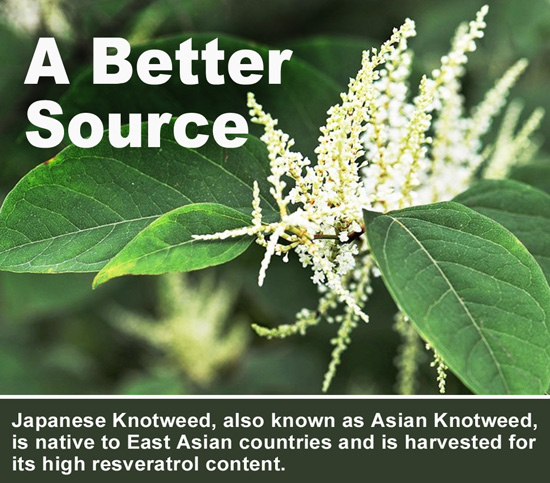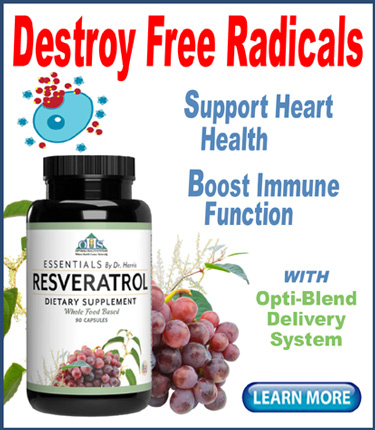For decades now many health-conscious people have included a glass or two of red wine in the evening as part of their “supplement” regimen.
This is done in the hope the nutrients in the red wine are providing some protection against heart disease and cognitive decline.
The primary nutrient that people are hoping to absorb is a potent polyphenol named resveratrol.
Resveratrol, widely acclaimed for anti-inflammatory benefits, was first promoted in relation to wine drinking in 1992. This was when researchers suggested that resveratrol might explain some of the cardio-protective effects of red wine.
In conjunction with this researchers started using the term French Paradox—referring to the observation that French people have a relatively low incidence of coronary heart disease despite a diet high in saturated fats. Many researchers attributed the paradox, at least in part, to their moderate consumption of red wine containing resveratrol.
Other scientists contest this claim, noting that studies on resveratrol use higher-dose supplements with an amount of resveratrol impossible to acquire through wine drinking.
Most governments take the middle road on alcohol
Notwithstanding this red wine debate, current guidelines in many countries today suggest that “light to moderate” drinking may have health benefits—particularly for heart and cognitive health.
It is important to acknowledge that all health authorities worldwide consider heavy drinking detrimental to health; it is only modest consumption that has been advocated by some.
However, in light of a new study that questions whether any level of alcohol consumption can be considered safe—at least in regards to brain health—red wine devotees may want to consider switching to resveratrol nutritional supplements.
The new study, published in BMJ Evidence-Based Medicine in September 2025, made some remarkable discoveries: Alcohol provides no protective effect at any level of consumption, and even light drinking may raise dementia risk.
The discoveries were made using a new approach for alcohol-brain research: A combination of observational analysis and genetic analysis.
By analyzing a large number of people in this way the researchers were able to determine if genetics played a part in any benefit (or disadvantage) received from alcohol consumption.
The study included two parts: First, an observational analysis using two large-scale population-based cohorts—the Million Veteran Program in the United States, and the UK Biobank in the United Kingdom.
Secondly, genetic analyses using summary statistics from genome-wide association studies. The genetic analyses included 559,559 adults aged 56–72 years at baseline.
Using traditional observational methods, the researchers initially found the familiar u-shaped pattern that seemed to confirm the claimed benefits of alcohol: Light to moderate drinkers appeared to have lower dementia rates than both heavy drinkers and non-drinkers.
Heart & Brain
While the relationship between resveratrol and cognitive function has evolved more slowly than resveratrol’s link to heart health, a growing body of research has found that resveratrol has a promising impact on brain health too.
A notable meta-analysis of studies on resveratrol supplementation in 2018 found a significant improvement in delayed recognition memory, with a standardized mean difference of 0.39. This points to resveratrol’s potential to boost certain cognitive functions.
This statistic underscores the compound’s potential as a cognitive enhancer, making it a subject of interest for expanded research.
See the study Effect of resveratrol supplementation on cognitive performance and mood in adults, published in Nutrient Reviews, here.
From benefit to liability
But when researchers dug deeper a different conclusion was drawn. When using the genetic data—which has the advantage of tracking lifetime drinking patterns rather than just current habits—the drinking “benefit” became a liability.
The genetic analyses utilized a system of epidemiology known as Mendelian randomization.
Mendelian randomization works like a natural experiment, but instead of relying on what people report about their drinking habits, it examines genetic variants that influence how much alcohol someone consumes throughout their lifetime.
The big advantage of utilizing this method is that it can better separate cause from correlation.
According to Wikipedia, “Mendelian randomization reduces both reverse causation and confounding, which often substantially impede or mislead the interpretation of results from epidemiological studies.”
Findings
According to the researchers, the findings provided “evidence for a relationship between all types of alcohol use and increased dementia risk.” Furthermore, people with genetic variants that predispose them to drink more alcohol showed higher dementia risk at every level of consumption.
Most at risk were those with genetic risk for alcohol use disorder, who faced a 16% increase in dementia risk.
Another important part of the study was the discovery that most people changed their drinking habits considerably over time—something that would skew observational findings. This helps explain why observational studies have long suggested moderate drinking protects against dementia.
The tracking in the current study showed that people who eventually developed dementia began reducing their alcohol intake years before their diagnosis—giving a misleading “snapshot” in time.
The researchers explained: “People experiencing the earliest stages of cognitive decline may unconsciously modify their drinking habits, creating the false impression that moderate drinking protects against dementia.”
– – –
While red grapes (primarily the skin) are recognized for their high resveratrol content, other foods—such as Japanese knotweed and grape seed—have higher concentrations.
Superior nutritional supplements, like Essential Resveratrol from Optimal Health Systems, provide resveratrol from these safer, higher-dose food sources.
Click the banner ad on this page to learn more about Essential Resveratrol.
– – –
Sources: BMJ Evidence-Based Medicine, Nutrient Reviews, Wikipedia (Mendelian randomization).


